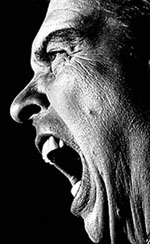Political civility and religious liberty
Exploring the connection between the First Amendment and political civility
By Bruce T. Murray
Author, Religious Liberty in America: The First Amendment in Historical and Contemporary Perspective
 Political civility in America seems to have taken a dive southward, with a recent spate of rude outbursts, accusations and the ever-blaring talk shows. Calmer-minded pundits lament the loss of civility and basic decency in American political discourse.
Political civility in America seems to have taken a dive southward, with a recent spate of rude outbursts, accusations and the ever-blaring talk shows. Calmer-minded pundits lament the loss of civility and basic decency in American political discourse.
One way to understand the current situation is to explore the history of political incivility in America – from the poisoned atmosphere preceding the Civil War to the McCarthy era and Watergate. In light of this checkered past, it would be difficult to argue, “it’s the worst it’s ever been.” How, then, does one gauge standards of civility in the present time?
Often overlooked in the discussion is the role of the First Amendment and religious liberty in America’s civil discourse. The First Amendment not only guarantees freedom of speech – either civil or uncivil – but it also ensures that the government will not interfere with religious practice or impose religious doctrine on its populace. The Religious Liberty Clauses thereby foster pluralism as a civic ideal.
According to Professor Philip Goff of Indiana University-Purdue University Indianapolis, pluralism is a philosophical commitment to diversity, a belief that there is some intrinsic good in difference. Implicit in this philosophy is respect for difference, which translates to civility. Pluralism with respect to religion filters down to many different layers and forms the bedrock of civil society.
Behind the 45 words contained in the First Amendment are a set of core values that Americans of all ethnicities, religious affiliations and political persuasions share – from Al Franken and Rush Limbaugh to Barack Obama and Joe Wilson. Even when political discourse takes a plunge downward, there is still an expectation and a basic standard that most Americans understand, even if they don't always adhere to it. If there were no such expectation, there would be no recriminations and apologies for bad behavior, only more flames.
“Some nations, like those in Europe, have high political civility and very low religiosity; and other nations have high religiosity but low political civility. The United States is a nation with high religiosity and also high political civility. We are one of the few nations with both,” said First Amendment scholar Charles Haynes. “The place we are in is a very fortunate place, but danger lies ahead if we don’t attend to the founding principles of this messy experiment called the United States.”

Haynes and Goff are quoted in the University of Massachusetts Press book, Religious Liberty in America: The First Amendment in Historical and Contemporary Perspective by Bruce T. Murray.
In addition to discussing political civility, Religious Liberty in America surveys the development of religious pluralism in America for the past 400 years – from early colonial times to present controversies, such as the mixing of religion and politics, battles over religious symbols in the public square, the “culture wars,” immigration and faith-based initiatives.
Religious Liberty in America was selected by Choice – a publication of the Association of College and Research Libraries – as an “Outstanding Academic Book.”
“This book is a splendid presentation of the First Amendment – with civil religion as a parallel theme – especially as presently related to so many issues in American political and religious life. Other books on these issues have been appearing of late, but none as clear and thorough as this one.”
— G.H. Shriver, Professor Emeritus, Georgia Southern University
Religious Liberty in America is available at numerous university libraries, and it may be purchased from the University of Massachusetts Press.
Find out more about the author here.

